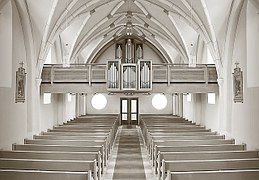By Kayleigh Butterfield
On February 9, 2016, the Fourth Circuit issued its published opinion in the civil case Andon LLC v. City of Newport News. In this case, Andon, LLC, and Reconciling People Together in Faith Ministries, LLC (collectively, Plaintiffs) filed a complaint against the City of Newport News, Virginia (the City). Plaintiffs’ complaint alleged that the City violated the Religious Land Use and Institutionalized Persons Act (RLUIPA) by denying Plaintiffs’ variance request that would permit them to use a specific property as a religious facility. The Fourth Circuit affirmed the district court’s dismissal for failure to state a claim, and its denial of Plaintiffs’ request to amend their complaint.
Church Faces Setback
Walter T. Terry Jr. formed Reconciling People Together in Faith Ministries, LLC (the congregation) in 2012. Terry began looking for a building for the congregation to use and eventually found a property for “lease or sale” by Andon, LLC. The City’s zoning ordinance for commercial properties, such as the one at issue, provided four conditions for properties to be used for a church or place of worship. One of the factors stated that no building may be “located within 100 feet of any side or rear property line which is zoned single-family residential.”
Knowing that the property did not meet the ordinance’s setback requirement, Plaintiff’s filed a request for a variance from the Board of Zoning Appeals (BZA). BZA ultimately denied the variance request. Plaintiffs then brought action under RLUIPA claiming that the denial imposed a substantial burden on Plaintiffs’ exercise of religion.
Dismissal Under 12(b)(6)
Reviewing the district court’s decision de novo, the Fourth Circuit relied heavily on its previous decision in Bethel World Outreach Ministries v. Montgomery County Council. In that case, the Fourth Circuit concluded that the plaintiffs successfully brought a substantial burden claim under RLUIPA, because the regulations at issue substantially pressured the plaintiffs to modify and then abandon their pre-existing plan to construct a church building. The Fourth Circuit distinguished Plaintiffs’ claim from Bethel by noting that Plaintiffs had no reasonable expectation that they could use the property for religious purposes. Rather, Plaintiffs knew that the City had an ordinance in place prohibiting such use. Thus, Plaintiffs assumed the risk when they entered into the lease agreement and applied for a variance instead of continuing to search for a usable property. The Fourth Circuit reasoned that Plaintiffs could not show any facts indicating that the burdens were not self-imposed.
Affirmed
Accordingly, the Fourth Circuit affirmed the district court’s decision to dismiss with prejudice, along with the denial of Plaintiffs’ request to amend their complaint.






